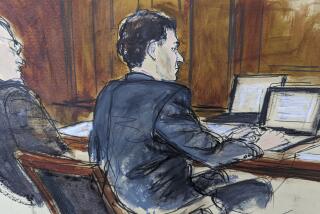Winans Did Nothing Illegal, Attorney Says : Journal ‘Insider’ Case Trial Begins
- Share via
NEW YORK — A former Wall Street Journal reporter, accused of misusing inside information to make quick money in the stock market, went on trial Monday with his attorney denying that he did anything illegal.
R. Foster Winans, his roommate, David Carpenter, and Kenneth P. Felis, a former broker at Kidder, Peabody & Co., are charged in a 61-count indictment with conspiracy, securities fraud and wire and mail fraud in a scheme to profit by trading on their knowledge of what would appear in Winans’ columns.
The non-jury trial before U.S. District Judge Charles E. Stewart Jr. was expected to last a week or two.
‘Defrauded Newspaper’
With the basic facts undisputed, prosecution and defense lawyers immediately clashed over whether the group’s clandestine dealings were against the law.
Before being fired last spring, Winans was one of two reporters who produced the Journal’s “Heard on the Street” column, an influential daily feature that offers advice to investors.
The Journal, like many major news organizations, forbids reporters from owning stock in companies they cover or from leaking details of upcoming stories to outsiders.
Assistant U.S. Atty. Peter J. Romatowski said in his opening statement that Winans and his associates defrauded the newspaper by violating the policy, buying and selling stocks to profit on the price moves that were expected to result from Winans’ forthcoming columns.
Peter N. Brant pleaded guilty to fraud and conspiracy charges in the case last summer and is expected to testify for the prosecution. Brant was a top broker for Kidder, Peabody who received information from Winans and involved Felis, an old college friend, in the trading.
“Each of the defendants knew that what they were involved in was a fraud,” Romatowski said. Winans, he said, placed calls to Brant from phone booths and used an assumed name to avoid detection at the Journal.
Winans’ lawyer, Don Buchwald, countered that a breach of the newspaper’s policy did not amount to a crime.
“No fraud was committed, because we have not yet delegated in this society to employers the power to determine criminal conduct,” Buchwald said.
Began Secret Trading
Winans “knew that if he bought stocks he was writing about and the Wall Street Journal found out about it, he would be fired. He did not know and did not believe that what he was doing was a violation of the law.”
Winans, 36, began writing the column in August, 1982. The newspaper paid him $610 a week.
In January, 1983, Romatowski said, Winans and Carpenter began secretly trading in stocks that were the subject of columns Winans planned to publish. They made about $3,300 in stocks of two companies, according to prosecution papers.
In mid-1983, Winans interviewed Brant, then the top-earning broker at Kidder, Peabody, for a possible feature story. In October, Winans visited Brant’s home and, according to the prosecution, offered to give him tips on upcoming columns in return for money.
Buchwald asserted Monday that the idea for the scheme originated with Brant.
Between October, 1983, and March, 1984, when an investigation by the Securities and Exchange Commission unearthed the scheme, the group allegedly netted more than $670,000 in profits.
Payments Alleged Felis and Brant paid Winans $31,000, Romatowski said, making the checks payable to Carpenter and recording them as payment for fictitious decorating services. The checks were deposited in a joint account shared by Winans and Carpenter.
The trial’s first witness, Stewart Pinkerton, an assistant managing editor of the Journal, said he told Winans at the time he joined the newspaper to be “absolutely squeaky clean about doing anything that would present even the appearance of conflict of interest.”
In late 1982, upon hearing an unsubstantiated rumor that the content of a forthcoming Winans column had been leaked to investors, Pinkerton said he had another talk with the reporter.
“I explained to Mr. Winans the importance of not signaling to outsiders the thrust or timing of any articles we do,” Pinkerton said. “It’s very important for the credibility of the paper.”
More to Read
Inside the business of entertainment
The Wide Shot brings you news, analysis and insights on everything from streaming wars to production — and what it all means for the future.
You may occasionally receive promotional content from the Los Angeles Times.










